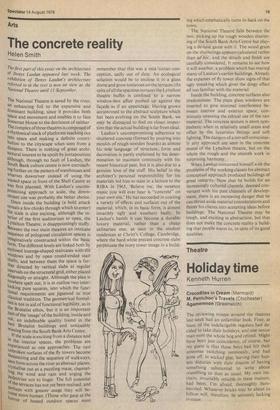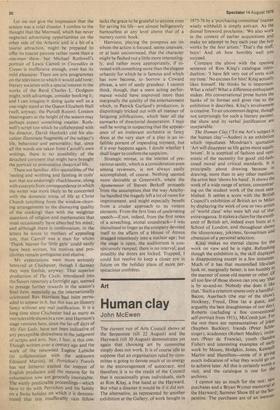Theatre
Holiday time
Kenneth Hurren
Crocodiles in Cream (Mermaid)
M. Perrichon's Travels (Chichester) Agamemnon (Greenwich)
The reviewing troupe around the theatres last week had an unfamiliar look. Four, at least, of the indefatigable regulars had decided to take their holidays, and one senior man went the whole hog and retired. Might have been just coincidence, of course, but my guess is that those boys had felt their antennae twitching ominously, and had gone off, in wicked glee, leaving their hapless deputies with their dreams of having something substantial to write about crumbling to dust as usual. My own instincts, invariably reliable in these matters, had been, I'm afraid, thoroughly bamboozled. Whatever bricks may be about to follow will, therefore, be seriously lacking in straw.
Let me not give the impression that the session was a total disaster. I confess to the thought that the Mermaid, which has never neglected advertising opportunities on the other side of the Atlantic and is a bit of a tourist attraction, might be prepared to offer its tourist patrons rather more than a one-man show, but Michael Rothwell's portrait of Lewis Carroll in Crocodiles in Cream is inoffensive enough, even has its mild pleasures. There are arts programmes on the television to which it would add tone; literary societies with a special interest in the works of the Revd Charles L. Dodgson might, with advantage, consider booking it; and 1 can imagine it doing quite well as a one-night stand at the Queen Elizabeth Hall (well, anyway, the Purcell Room). London theatregoers at the height of the season may perhaps expect something meatier. Rothwell's script (on which he collaborated with his director, David Horlock) cnd his elocution illuminate fragments of the subject's life, behaviour and personality, but, since all the words are taken from Carroll's own writings, there is no possibility of the detached comment that might have brought the portrait to provocative theatrical life.
There are familiar Alice quotations of the 'reeling and writhing and fainting in coils' sort that are enduringly chucklesome, along with excerpts from correspondence in which the writer was more likely to be concerned with the domestic trivia of life at Christ Church (anything from the window-cleaning arrangements to the dismaying quality of the cooking) than with the weightier questions of religion and mathematics that must occasionally hake absorbed his mind; and although there is confirmation, in the letters he wrote to mothers of appealing tots, that Carroll was a man for whom 'Thank heaven for little girls' could easily have been written, his motives and proclivities remain ambiguous and elusive.
My expectations were more seriously betrayed at Chichester, though I daresay they were foolish, anyway. That superior production of The Circle, introduced into the Sussex repertory a fortnight ago, seemed to presage further rewards in the season's final item, especially as the internationally celebrated Rex Harrison had been persuaded to appear in it, but this was an illusory fancy without any real justification. It is a long time since Chichester had as many as two tolerable shows in a row, and Harrison's stage ventures here, since the far-off days of My Fair Lady, have not been indicative of any perceptible shrewdness in the judgment of scripts and arts. Nor. I fear, is this one. Though written over a century ago and the work of the renowned Eugene Labiche (in collaboration with the unknown Edouard Martin), M. Perrichon's Travels has not hitherto excited the interest of English producers and the reasons for its exhumation now are generally inscrutable. The wanly predictable proceedings—which have to do with Perrichon and his family on a Swiss holiday on which it is demonstrated that this insufferably vain fellow
lacks the grace to be grateful to anyone even for saving his life—are almost belligerently humourless at any level above that of a nursery comic book.
Harrison, playing the pompous ass on whom the action is focused, seems unaware, or at least unconvinced, that the character might be fleshed out a little more interestingly, and rather more appropriately, if invested with something more than the elegant urbanity for which he is famous and which has now become, to borrow a Coward phrase, a sort of seedy grandeur. I cannot think, though, that a mere acting pei formance would have improved more than marginally the quality of the entertainment which, in Patrick Garland's production, is dispiritingly tricked out with all manner of fatiguing jollifications, which bear all the earmarks of directorial desperation. I may well be wrong in suspecting that the appearance of an irrelevant orchestra in fancy dress at the very start of a play is an infallible portent of impending torment, but if it ever happens again. I doubt whether I shall linger to confirm the suspicion.
Strategic retreat, in the interest of precarious sanity, which is a consideration even among reviewers, is not always easily accomplished, of course. Nothing seemed more desirable at Greenwich, where the ,Agamemnon of Steven Berkoff proceeds from the assumption that the way Aeschylus handled the tragedy left a lot of room for improvement, and might especially benefit from a cruder approach to its violent elements. From the first lines of unelevating speech—if not, indeed, from the first notes of a screeching, atonal soundtrack—I was disinclined to linger as the company devoted itself to the affairs of a House of Atreus dragged relentlessly into a nuclear age; but the stage is open, the auditorium is conspicuously ramped, there is no interval, and possibly the doors are locked. Trapped, I could but resolve to keep a closer eye in future on the holiday plans of more perspicacious confreres.



























 Previous page
Previous page